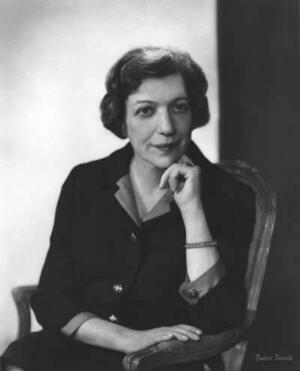Judge Justine Wise Polier Retires
Building on the legacy of her parents, labor activist and rabbi Stephen Wise and social reformer Louise Waterman Wise, Justine Wise Polier spent four decades on the New York City Family Court working for the rights of children before retiring on February 3, 1973.
Born on April 12, 1903, Polier studied at Bryn Mawr College and Radcliffe College before graduating from Barnard College. After graduation, she sought work in the textile mills of Passaic, NJ, wanting to be involved in the lives of workers struggling for union recognition. To avoid association with the pro-labor views of her famous father, she used her mother's maiden name. When her identity was discovered, she was fired and blacklisted, because mill owners feared she would put her father's pro-union sentiments into action.
Heeding her father's advice to seek social justice through the law, Polier entered Yale University Law School in 1925. At Yale, she was elected to an honorary society and became an editor of the Yale Law Journal. She also became deeply involved in a strike in Passaic, earning the epithet "Joan of Arc of the mills."
Beginning in 1929, Polier held a series of positions with the Workman's Compensation Division of the New York State Department of Labor. In 1935, New York City Mayor Fiorello La Guardia appointed her to a judgeship in the city's domestic relations court (which later became the family court). She thus became the first woman judge above the level of magistrate in the state and the youngest municipal judge in the country. Fearing she was being "kicked upstairs" in order to silence her outspoken criticism of municipal services, Polier originally told La Guardia that she would sit on the court for one year. That one year stretched into 38.
Polier was known for her judicial activism. Always concerned with social justice, she worked with others on the family court to fight racial and religious discrimination, and sought to turn the juvenile justice system into a tool of treatment rather than punishment. Attentive to the findings of social and behavioral sciences, Polier turned her court into the center of a web of cooperation between the legal system, families, and a network of social service organizations. Notably, she helped to develop the concept of the "best interests" of the child as a foundation for legal decision-making. Also notable was her ruling in the Skipwith case (1958-61), which determined that the state was responsible for de facto segregation in the Harlem public schools.
Polier was as active in social justice off the bench as on it. As vice president of the American Jewish Congress, she helped steer that organization towards activism on behalf of racial minorities. She helped to found the Citizens Committee for Children, an advocacy group, and collaborated with Eleanor Roosevelt to create the Wiltwyck School for emotionally disturbed children.
Polier was originally scheduled to retire in 1974, but stepped down a year early in order to become the director of the Juvenile Justice Division of the Children's Defense Fund, monitoring juvenile detention policies across the United States. She told reporters at the time that her decision was fueled by changes in federal welfare laws and by President Nixon's 1972 veto of the Comprehensive Child Development bill, which would have provided a comprehensive range of services for children regardless of their parents' economic status. She also wanted to combat institutional racism in the agencies that served troubled children.
When Polier died in 1987, she left a legacy of profound commitment to the welfare of all children, an expanded tradition of judicial activism, and a host of organizations and individuals transformed by her work.
Sources: Jewish Women in America: An Historical Encyclopedia, pp. 1089-1091; New York Times, 3 February 1973, 2 August 1987.




It is interesting to me that there is nothing in the article about her dedicated involvement and years of service to Louise wise Services, the premier adopition agency of the 20th centruy. i served under her mentorship first as a board member and then as Chair of the Board from many years. I also was adopted from the agnecy when i was six weeks old. it was then called The Free Synagogue Adoption Agency and was begun by her mother Louise Waterman Wise,